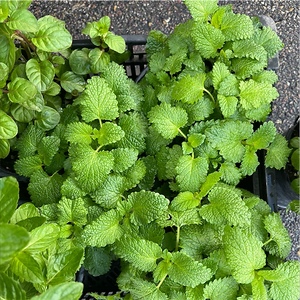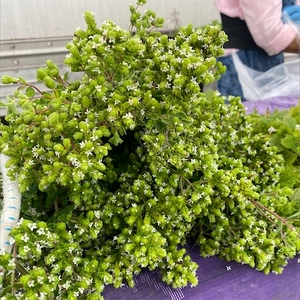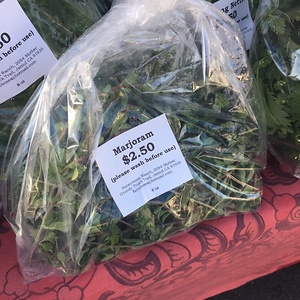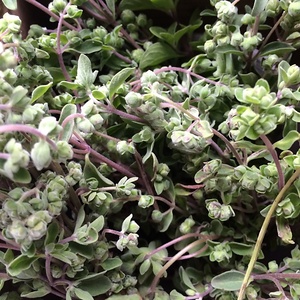


Marjoram
Estimated Inventory, lb : 6.67
This item was last sold on : 07/24/25
Description/Taste
Marjoram is a shrub-like herb that looks very similar to oregano, so similar in fact, that the two are often mistaken for each other. Marjoram grows like a small shrub, or “subshrub,” with multi-branched stems growing up to three feet in height. Marjoram has light green, slightly oval-shaped leaves, growing in pairs along its tender stems. The leaves tend to be more round and elliptical than those of oregano, with the same fuzzy texture. Marjoram has a sweet flavor, the source of which is a natural chemical called Sabinene hydrate. The sweetness is mixed with hints of pine and citrus. Marjoram doesn’t have as strong an aroma or flavor as oregano, and is a bit more versatile. Small white flowers bloom at the top of the stems, in spikes (or bracts) that have a similar appearance to hops. The ideal harvest time is just before the flowers bloom, when the amount of essential oils is at its peak.
Seasons/Availability
Marjoram is available year-round.
Current Facts
Marjoram is a cold-sensitive perennial herb grown for its aromatic leaves. It is an key ingredient in many European and Mediterranean cuisines. Marjoram is botanically classified as Origanum majorana. It is a very close relative of oregano (O. vulgare) and is often mistakenly referred to as such. Marjoram is very similar to oregano, but botanically it is a different species with a different flavor. The leafy herb is further distinguished from the other “oreganos” by its common name: Sweet Marjoram.
Nutritional Value
Marjoram contains high amounts of iron, and is a source of both vitamins A and C, and calcium. It contains both manganese and vitamin K. Marjoram is used to help calm digestive troubles, such as nausea and bloating. The natural compounds and phytochemicals in Marjoram, carvacrol and thymol, give the herb antiseptic, anti-bacterial, anti-fungal, and anti-inflammatory properties. Marjoram essential oil is also used topically on the skin.
Applications
Marjoram has a lot of different uses; it can be used in both savory and sweet dishes. The leaves are removed from the stem prior to use. Marjoram is most often associated with flavoring poultry stuffings or sausages. Use Marjoram in marinades for either meat, fish and poultry or vegetables. The herb pairs well with vegetables and like its oregano cousin, tomato-based sauces and soups. It compliments other herbs like thyme, tarragon, parsley and basil. Where Marjoram takes a giant departure from the typical Origanum variety, is when it is used in sweet applications. Marjoram can be used to flavor custards, ice cream, pies, tarts and other desserts with fruit; it pairs well with melons, apples, and tropical fruits. Fresh Marjoram may be kept in the refrigerator for up to a week. Dry Marjoram on screens or hung upside down in bunches tied with twine. The dried herb will keep for up to six months when stored in an airtight container.
Ethnic/Cultural Info
Marjoram has a long history of use as a medicinal herb. It was associated with love and happiness, purification and healing during ancient times by Greeks, Romans and Europeans. Before hops were widely used to make beer, it was Marjoram and oregano that flavored ales during the Middle Ages. Marjoram essential oil is widely used in cosmetics and other products such as perfumes, deodorant, and mouth washes.
Geography/History
Marjoram is native to the eastern portion of the Mediterranean, and grows wild on the mountain slopes in Italy, Greece, Turkey, and Egypt. It thrives in a temperate climate where it isn’t too hot and doesn’t get too cold. Similarities between Marjoram and oregano have caused identification problems and confusion for centuries. Origanum species have long been confused for one another. Originally classified by Carl Linnaeus as a member of the genus Amaracus, Marjoram was reclassified to the genus Origanum in 1980 by Amsterdam botanist J.H. Ietswaart. This has not helped with the confusion. Marjoram is cultivated for both culinary and commercial use in the Mediterranean and by small farms in temperate regions around the world.
Featured Restaurants
Restaurants currently purchasing this product as an ingredient for their menu.
| Encontro North Park | San Diego CA | 310-955-6333 |
| Side Bar | San Diego CA | 619-348-6138 |
| Vulture / Dreamboat | San Diego CA | 858-342-3609 |
| LANA | Solana Beach CA | 602-758-2596 |
| The Victorian at Hill Street | Oceanside CA | 442-266-8285 |
| Town & Country Main Storeroom | San Diego CA | 619-291-7131 |
| Marisi La Jolla | La Jolla CA | 951-852-6730 |
| Relic Bageri LLC | San Diego CA | 619-335-6328 |
| Sonny's Pizza | San Diego CA | 619-432-1838 |
| Wildland | Carlsbad CA | 619-385-0914 |
| Cafe Coyote | San Diego CA | 619-291-4695 |
| Kitchens for Good - Culinary Program | San Diego CA | 619-450-4040 |
| Town & Country Arlo | San Diego CA | 619-291-7131 |
| Seasoned Catering and Events | San Diego CA | 619-246-4909 |
| La Jolla Beach & Tennis Club | San Diego CA | 619-816-8319 |
| Farmer and The Seahorse | San Diego CA | 619-302-3682 |
| Campfire | Carlsbad CA | 760-637-5121 |
| Ctzn | Solana Beach CA | 858-925-7141 |
Recipe Ideas
Recipes that include Marjoram. One











